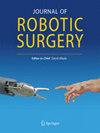机器人与腹腔镜远端胃切除术与Billroth I和II重建:系统回顾和荟萃分析。
摘要
机器人远端胃切除术(RDG)越来越多地用于治疗胃癌,然而,其相对于腹腔镜入路(LDG)的安全性和有效性尚不清楚,特别是在考虑重建方法作为混杂因素的情况下。本系统综述和荟萃分析旨在评估RDG与LDG在胃癌患者中进行Billroth I和II重建的短期结果。根据PRISMA指南进行了系统审查。我们搜索了Pubmed, Scopus和Cochrane图书馆,截止到2024年10月22日。分析的主要结局是出血量、手术时间和淋巴结清扫数量,次要结局包括总并发症、口服摄入时间、住院时间和首次放屁时间。采用随机效应模型计算加权平均差(WMD)和95%置信区间(CI)的优势比(OR),并采用I2统计量评估异质性。并计算P值。对中度至高度异质性的结果进行敏感性分析。纳入5项研究,共纳入811例患者(RDG: n = 289, LDG: n = 522)。与LDG相比,RDG与更长的手术时间相关(WMD = 34.14 min, 95%CI 10.92 ~ 57.35, P = 0.004, I2 = 91%)。RDG患者开始口服摄入较早(WMD = -0.20天,95%CI = -0.39 ~ -0.01, P = 0.03, I2 = 45%)。RDG导致住院时间缩短(WMD = -1.48天,95%CI = -2.91 ~ -0.04, P = 0.04, I2 = 86%)。RDG患者的肠功能恢复(到首次放屁的时间)更快(WMD = -0.33天,95%CI = -0.50 ~ -0.15, P = 0.00003, I2 = 57%)。RDG和LDG的失血量差异无统计学意义(WMD = -3.88 mL, 95%CI = -21.63 ~ 13.87, P = 0.67, I2 = 78%)。两组并发症发生率差异无统计学意义(OR = 0.61, 95%CI 0.36 ~ 1.03, P = 0.06, I2 = 0%)。两组淋巴结清扫数无显著差异(WMD = -0.49, 95%CI = -3.02 ~ 2.04, P = 0.70, I2 = 24%)。敏感性分析证实了手术时间和首次放屁时间的稳健性。与LDG相比,合并BI/ BII的RDG需要更长的手术时间,但恢复速度更快。RDG和LDG在总体并发症、淋巴结切除数量和出血量方面没有差异,表明RDG与LDG一样安全且在肿瘤学上相当。未来的研究,特别是多中心随机临床试验,应该有更长的随访期,并单独检查重建的类型。普洛斯彼罗注册:CRD42024605895。Robotic distal gastrectomy (RDG) has been increasingly used for the treatment of gastric cancer, however, its comparative safety and efficacy against the laparoscopic approach (LDG), remains unclear, especially when accounting the reconstruction method as a confounder. This systematic review and meta-analysis aims to evaluate the short-term outcomes of RDG vs LDG In patIents with gastric cancer, undergoing Billroth I and II reconstruction. A systematic review was conducted in accordance with PRISMA guidelines. We searched Pubmed, Scopus and the Cochrane Library, up to October 22nd, 2024. The primary outcomes analyzed were the blood loss, operative duration, and the number of harvested lymph nodes and the secondary outcomes included overall complications, time to oral intake, duration of hospitalization and time to first flatus. Random-effects models were used to calculate weighted mean differences (WMD) and Odds ratios (OR) with 95% confidence intervals (CI), and heterogeneity was assessed using the I2 statistic. P values were also calculated. Sensitivity analysis was performed for outcomes with moderate to high heterogeneity. Five studies were included, involving 811 patients (RDG: n = 289, LDG: n = 522). RDG was associated with a significantly longer operative duration compared to LDG (WMD = 34.14 min, 95%CI 10.92 to 57.35, P = 0.004, I2 = 91%). RDG patients initiated oral intake earlier (WMD = -0.20 days, 95%CI -0.39 to -0.01, P = 0.03, I2 = 45%). RDG resulted in shorter hospital stays (WMD = -1.48 days, 95%CI -2.91 to -0.04, P = 0.04, I2 = 86%). RDG patients had a faster return to bowel function (time to first flatus) (WMD = -0.33 days, 95%CI -0.50 to -0.15, P = 0.00003, I2 = 57%). No statistically significant differences were observed regarding blood loss between RDG and LDG (WMD = -3.88 mL, 95%CI -21.63 to 13.87, P = 0.67, I2 = 78%). There was no statistically significant difference in complication rates (OR = 0.61, 95%CI 0.36 to 1.03, P = 0.06, I2 = 0%). No significant differences were observed regarding the number of lymph nodes harvested (WMD = -0.49, 95%CI -3.02 to 2.04, P = 0.70, I2 = 24%). Sensitivity analysis confirmed the robustness of the findings of operative duration and time to first flatus. RDG with BI/ BII requires longer operative duration, but it associated with faster recovery compared to LDG. No differences were observed between RDG and LDG with regards to overall complications, number of harvested lymph nodes and blood loss, showing that RDG is as safe and oncological equivalent to LDG. Future studies particularly, multi-center randomized clinical trials, should have a longer follow up period and examine the type of reconstruction separately. PROSPERO registration: CRD42024605895.

 求助内容:
求助内容: 应助结果提醒方式:
应助结果提醒方式:


